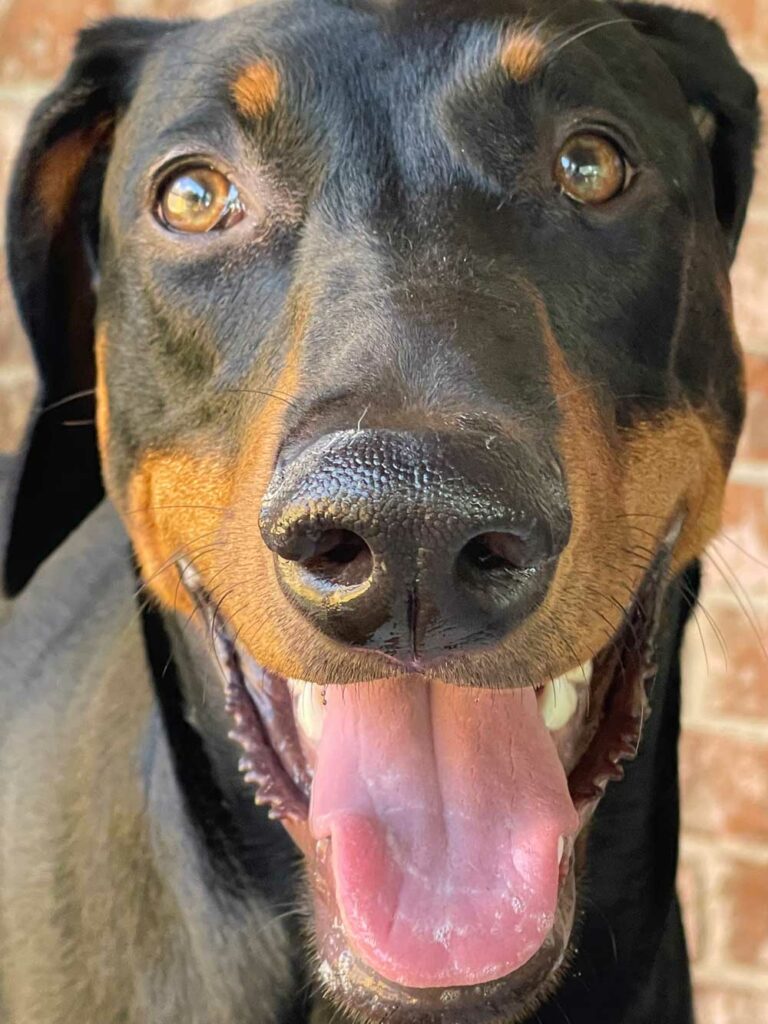How Deodorme Works
The Magic of the Rain Forest and Wisdom of the Orient

Maya (left) does not have noticeable body odor despite never taking a bath.
Perspiration AKA Sweat
If you love dogs as we do, you know that they do not have objectionable odors unless something is wrong with them.
It’s been our observation that if dogs stink, its their mouths. Periodontitis and rotten teeth stink, just like in humans.
Odors in their “legpits,” are imperceptible to humans.
Just like humans, dogs have 2 layers of skin, the epidermis and dermis. Hairs growing from follicles firmly anchored in the dermis are lubricated by oil from sebaceous glands, again just like humans. Long haired dogs need an occasional bath for the same reason humans shampoo their hair.
Unlike humans, dogs’ eccrine (merocrine) and apocrine glands glands don’t contribute to body odor. The volume of water excreted from these glands isn’t enough to cool the dog and it’s not enough to make a hospitable environment for excess bacteria.
That big, moist, slobbery mouth is not just for eating, it’s the main way they cool themselves. Panting rapidly, with the tongue hanging out, is a good sign your canine friend needs to cool off. It’s their way to perspire.
Under similar conditions, you too would probably need to cool off, but you may not even be aware that your body’s marvelous cooling system has already solved your problem.
Perspiration is just one thing our skin does. But before we talk about how de•odor•meTM works, we should discuss how skin works.
Human Skin
No Main Function
Skin has no main function. It’s a multi-functional organ, the largest organ of our adult bodies. Some of its functions are:
- Sort of a barrier. More like an intelligent sieve, most of the time. And maybe not so intelligent. It depends on you to be intelligent.
- Secreting organ. It secretes substances to regulate temperature, maintain a healthy skin biome, and maybe even attract a mate.
- Giant radiator. It regulates our body temperature.
- Sensory Organ. It can feel pain and tell us when to get out of the way.
- Makes hormones like vitamin D, testosterone, and androstenedione.
- Recipient of hormones from other organs of the body for further processing.
- Interface between the environment and our immune system.
- It uses sun light for energy to make important metabolites. (Not like plants, but nevertheless true.)
The Skin is a Barrier
The skin is often called a barrier. Compared other animals whose shells, pelts, or feathers provide physical protection in a dangerous world, human skin is quite fragile.
We expend a lot of energy covering it with clothes and even body armor.
The reason we call it a sieve is because a lot of substances can penetrate it even if they are harmful.
DMSO, dimethyl sulfoxide, is a colorless liquid that quickly penetrates the skin and leaves a garlic taste in the mouth within a few seconds.
Many other things penetrate the skin too. It’s called percutaneous penetration.
Prior to the late 1950’s, cosmetic manufactures thought that nothing penetrated the skin. Now experts suspect that everything penetrates the skin to varying degrees.
Think of it as a sieve, not a barrier!
Secreting Organ
The skin secretes a lot of substances. Among the most notable is sweat. Others include oil, to lubricate the skin and hair, and defensins to protect against microbes.
A certain amount of heat is lost from our bodies by radiation. Secreting water onto the surface of the skin by sweating greatly amplifies the body’s ability to cool more quickly.
Skin can also quickly turn off secretions and close down surface blood vessels to conserve body temperature when the environment is cold. It’s controlled by the nervous system.
Three kinds of glands have been identified that secrete different substances in addition to cooling water.
Apocrine and Apoeccrine glands are the ones we are most interested in. They are in the armpits and crotch. They also secrete pheromones to subtly make us attractive to the opposite sex.
Apocrine glands secrete food for the billions of bacteria that live in our armpits and crotches.
Killing the bacteria is harmful for too many reasons to discuss here. Deodorme doesn’t kill bacteria, it simply stops the stinky ones from eating too much and excreting their foul volatile waste products.
Giant Radiator
Like a radiator on a car, the heat generated by our body/engine flows to the surface through blood vessels. There it exits the body as radiant heat.
So the skin gets rid of heat two ways: through radiation assisted by evaporation of sweat.
Deodorme’s low evaporation point assists the body’s natural sweat to cool down the body and turn off sweat glands.
Why Perspiration Stinks
Body odor, aka bromhidrosis, osmidrosis, ozochrotia, or simply malodor are names for what is admittedly a subjective judgement. Living in a place where everyone stinks the same means no one stinks.
There is a genetic component to body odor. Armpit odor in Asians is subjectively milder than in Africans and Europeans.
Getting the stereotypes out of the way, it has been shown that men stink more than women. (PMID: 19147808 ) Babies don’t smell that bad, but most old people are offensive unless they use deodorme.
Types of Sweat Glands
The three types of sweat glands in humans are called apocrine and eccrine, and, apoeccrine.
Apocrine sweat glands in humans are only found in the arm pits, crotch, the nipples of the breast, ear canals, eyelids, and side of the nose. They secrete, water for cooling, protein, carbohydrate , fats, and and hormone-like substances.
Eccrine glands are found everywhere including all of the above. They secrete watery perspiration containing sodium and potassium salts, and a few fatty acids that make the skin weakly acid.
Apoeccrine glands are also found in the crotch and armpits, and like eccrine glands produce watery perspiration, but more than apocrine and eccrine glands combined.
Stinky Sweat Glands
Apocrine glands located in the moist, warm armpits and crotch provide nutrition that bacteria need to quickly reproduce. Their secretion rate is higher than eccrine glands and they provide more nutrients.
Deodorme curbs the appetite of these microbes without destroying the favorable acid balance that prevents outside bacteria from invading.
Apoeccrine and eccrine glands also contribute to body odor in two ways: they increase the moisture in armpits and they carry out odors from food we eat like onions, garlic, and spices.
Other foods we eat that contribute to endogenous body odor are: alcohol, broccoli, cabbage, Brussels sprouts, cauliflower, red meat, and asparagus, in addition to onions, garlic, and spices.
These are considered healthy foods. Just eat them with friends and give them time to digest. No one will notice the odor, unless you have the other kind of odor that deodorme effectively stops.
Some odors created within the body come from diabetes, hormone imbalances, and metabolic disturbances, some of which are genetic. They may be excreted through the skin or commonly through the lungs and breath. Consult a doctor knowledgeable in these disorders.
Stinky Substances (This part is for chemists)
Apocrine glands secrete complex non-volatile, non-odorous molecules. One of these molecules is a dipeptide-conjugated thioalcohol called S-[1-(2-hydroxyethyl)-1-methylbutyl]-(L)-cysteinylglycine (Cys-Gly-3M3SH). It has to be actively transported into the bacteria for them to transform it into a free volatile and odoriferous thioalcohol.
Some of the volatile odor causing molecules that have been identified are:
- 3-methyl-2-hexenoic acid – E3M2H – has a peculiar pungent odor. Tropical fruit or grapefruit.
- 3-methyl-3-sulfanylhexan-1-ol – -MSH – Has onion, sage oil, chicken-sulfury odor.
- 3-hydroxy-3-methylhexanoic acid -HMHA – Cheesy, rancid odor.
- Trimethylamine – TMA – Rotten fish.
- Ammonia – Urine-like, ammoniacal, fetid.
- Methionine – boiled cabbage, rancid butter, rotten mushrooms.
Instructions
How to use de•odor•me for Armpits
Deodorme has two ways it reduces odor. It helps you cool faster and it slows the bacteria from making the volatile compounds.
If you are rested and not perspiring, apply de•odor•meTM liberally (six squirts) to each armpit and clothing under the armpit and allowed it to dry naturally. This way it holds the bacteria in equilibrium, including bacteria that migrate on sweat onto clothing.
Then if you start to sweat, apply de•odor•meTM liberally to first help you cool quickly by speeding evaporation, and second replenish the active ingredients that have washed away in the sweat. It’s not lost. It’s absorbed by your clothing, especially cotton fabric, where it continues to prevent the fabric from stinking.
Deodorme enhances perspiration because it contains alcohol, which evaporates more quickly and removes heat faster than water.
Your body senses the drop in temperature and starts to turn off the sweat glands in a cascading fashion.
Then with your apocrine glands naturally turned off, you can relax knowing that you won’t create a stinky wet spot on your shirt.
The Magic of the Rain Forest and Wisdom of the Orient
The plant extracts in de•odor•meTM come from tropical climates for the most part. Others such as green tea pictured here have been known in China for centuries.
extracts in de•odor•meTM come from tropical climates for the most part. Others such as green tea pictured here have been known in China for centuries.
Most ancient references to green tea extol the benefits of consuming the tea. Lǐ Shí Zhēn, (李時珍) the Father of Traditional Chinese Medicine observed, “”tea is cold and lowers the fire.” The fire is what we now call inflammation.
Some of the bio-active agents in tea are called polyphenols. Strangely they are not well absorbed into our circulation when we drink tea. It turns out that they are used by bacteria in our gut, which produce metabolites that exert powerful anti inflammatory effects in our bodies.
Now we have learned that natural plant substances such as polyphenols in green tea, and alkaloids and flavinoids in Guaraná, can modify the way bacteria absorb the raw materials we produce in our sweat glands and prevent them from making bad smelling alcohols.